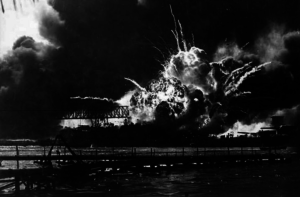View as PDF Chicago — Recent unprecedented disclosures of government malfeasance have forced Americans to confront unpleasant truths about the nature of our government. Americans do not trust the government – and in record numbers. It is understandable, and equally troubling, then, for Americans to come to expect opaqueness from a government that commonly flouts the U.S. Constitution andthe laws intended to bind its authority. We shouldn’t be too surprised to learn that the government is still fighting a seventy-four-year battle over transparency and the historical record, dating back to World War II.
Last week, the Obama administration’s efforts to maintain opacity received another healthy dose of sunlight after a panel of the 7th U.S. Circuit Court of Appeals voted 2-1 to unseal grand jury records related to the journalism of a Chicago Tribune correspondent’s June 7, 1942 report that implied the government had broken Japan’s secret naval code.
The implications of these revelations are far-reaching, just as Taxpayer Education Foundation reported previously. In a December 2011 analysis of the extensive body of scholarship concerning FDR’s foreknowledge of the Japanese military’s naval codes and planned attack at Pearl Harbor, Taxpayer Education Foundation’s research director, Dennis Constant, wrote, “In September and October of 1940, Army and Navy cryptographers solved the principal Japanese government code, the Purple code, which was the major diplomatic code. The naval codes were a series of 29 separate operational codes. According to Stinnett, Japan used four of these codes to organize and dispatch her warships to Hawaii by radio. American cryptographers had solved each of the four by the fall of 1941, even though the Japanese were introducing minor variants every three months to foil cryptographers.”
“Taxpayers, regrettably, are forced to fund the government even when its policies are opposed to the interests of Americans and our liberty,” said Jared Labell, executive director of Taxpayers United of America (TUA). “While it is clear that the government is naturally incentivized to over-classify information and maintain strict secrecy over its vast realm of perceived interests, Americans must demand transparency and support all efforts to pull back the curtain on the machinations of the government. Disclosures not only help clarify the historical record and provide further insights into past policies, but they are tremendous opportunities to learn how tax dollars are spent by the government and in pursuit of what ends.”
“These recent legal developments further threaten the government’s ability to act in complete secrecy without risk of exposure,” said Labell. “We aren’t certain of the precise revelations contained in thesealed grand jury testimony. The documents might further corroborate longtime claims made by numerous historiansimplicating FDR and his administration in failing to protect the American military personnel based at Pearl Harbor, although the Japanese naval codes were deciphered. The code-breaking revelations the following year in the Chicago Tribune did not please the administration, to say the least.”
“The Tribune’s tacit revelation of the code-breaking coup infuriated Washington. President Franklin Roosevelt wanted to have Marines occupy Tribune Tower,” the Chicago Tribune’s Editorial Board wrote last Friday following the court’s decision to unseal the records due to high historical interest and the negligible need for secrecy in 2016.
 “Under pressure from Roosevelt and Navy officials, a special prosecutor impaneled a federal grand jury here to consider espionage charges against reporter Stanley Johnston, managing editor J. Loy Maloney and the Tribune itself. The grand jurors decided not to indict. But for 74 years the testimony they heard from some 13 witnesses — including naval officers and staffers from the Tribune and two other newspapers that ran its story — has remained sealed.”
“Under pressure from Roosevelt and Navy officials, a special prosecutor impaneled a federal grand jury here to consider espionage charges against reporter Stanley Johnston, managing editor J. Loy Maloney and the Tribune itself. The grand jurors decided not to indict. But for 74 years the testimony they heard from some 13 witnesses — including naval officers and staffers from the Tribune and two other newspapers that ran its story — has remained sealed.”
Department of Justice lawyers have fought this disclosure at every turn, because even though the circumstances surrounding Johnston’s story and naval code-breaking at the Battle of Midway are invaluable to the historical record, the true court battle is concerned with the question of under what exceptional circumstances are grand jury proceedings to be made public.
President Woodrow Wilson signed the Espionage Act of 1917 into law in June of that year, only a couple months after the United States entered World War I. The case against the Chicago Tribune, its managing editor, and its reporter, Stanley Johnston, is the only known attempt to charge journalists with violating the Espionage Act, although the panel eventually declined to indict.
The government has until September 29 to appeal to the full 7th Circuit Court, or opt to appeal to the U.S. Supreme Court until mid-December 2016. Litigation director for the Reporters Committee for Freedom of the Press, Katie Townsend, summarized what’s at stake in this case that dates back nearly three quarters of a century, “The Tribune case speaks directly to a fundamental tension at the core of our democracy, involving the public’s right to know and the government’s duty to protect its citizens in time of war.”
“America, of course, isn’t a democracy, but it’s also barely a republic at this point. Chelsea Manning heroically liberated government records of the Baghdad airstrike Collateral Murder footage, Afghan and Iraq War logs, diplomatic cables, Guantanamo Bay files, and more. Edward Snowden disclosed National Security Agency documents while working as a contractor, revealing the government’s ubiquitous system of spying and surveillance of American citizens, foreign civilians and governments,” said Labell.
“Manning and Snowden merit our thanks for alerting the American public, not condemnation. Similarly, we don’t need to wait another 75 years to learn more about sealed testimony regarding a journalist, code-breaking, and our government’s actions during World War II. Taxpayers deserve to know.”
Founded in 1976, TUA is one of the largest taxpayer organizations in America.
West Dundee Trustees Consider Plan to Make Village the Tax Capital of the United States
View as PDF
WEST DUNDEE — Officials in West Dundee, Illinois have proposed a plan which could make their downtown area the tax capital of the United States. Earlier this year, the village board approved a measure designating a portion of downtown West Dundee a Special Services Area (SSA). This allows village officials to impose additional taxes in that area. After raising the sales tax by one percent earlier this year, the village is now proposing to increase property taxes in the SSA by more than 14 percent. The revenue generated by the additional tax would be used to fund debt service obligations related to a $2,000,000 bond issued by the village last year. If approved, property owners in the downtown West Dundee SSA will pay among the highest property taxes in the United States.
According to many impacted property owners, the village’s economic rationale for the tax increase is not credible. For homeowners and small businesses in the SSA, the new taxes could bring extreme economic hardship. Furthermore, they say the geographic boundaries of the SSA appear arbitrary.
Bonnie Yates lives in a charming, historic home on Main Street. The home is located on the property where famed detective Allan Pinkerton once had his home and cooperage—and there are rumors that Pinkerton’s home was a stop on Harriet Tubman’s Underground Railroad.

Bonnie Yates, 77, on the porch of her historic home in West Dundee, Illinois. The town is proposing a new taxing zone that will increase Yates’ property taxes by more than $1,100 per year. The building across the street from her is a law firm. They are not included in the SSA, which will save them an estimated $1,450 per year.
When Yates, 77, bought the property in 1989, the home was in serious disrepair. She spent thousands of dollars restoring the structure, and many thousands more maintaining it over the years.
In January 2016, village officials notified Yates that her home was included in the SSA, and that her taxes would increase. Yates was surprised, however, to find that the law firm just across the street from her was not located in the SSA. This means they are not subject to the new tax increase, which would amount to $1,450 per year for their law firm’s office. Also not included in the taxing zone were multiple businesses located along five additional blocks of Main Street.
When Yates contacted the village to learn more, she was told by a village official that her tax increase would amount to “only a few hundred dollars a year.”
However, Yates received a letter the following week, stating that the village had miscalculated the tax amount. The actual tax increase would be approximately ten times higher than what had been presented at the village board meeting just two months earlier. According to this letter, Yates’ property taxes would jump by more than $1,100 per year.
At 77 years old, Yates still works full-time as a marriage and family counselor. She says she would like to retire, but can’t afford to—especially if her property taxes will increase so substantially.
[trx_quote title=”Bonnie Yates”]I want to do my part to help the village, but it’s getting to be a burden at my age. I want to be able to retire without losing my home.”[/trx_quote]
The West Dundee Village Board will be holding a hearing and vote during its regular board meeting on Monday, August 22, regarding the proposed property tax increase in the downtown business district. The meeting begins at 7:30pm upstairs at the Village Hall, 102 S. 2nd St. (1/2 block south of Rt. 72).




